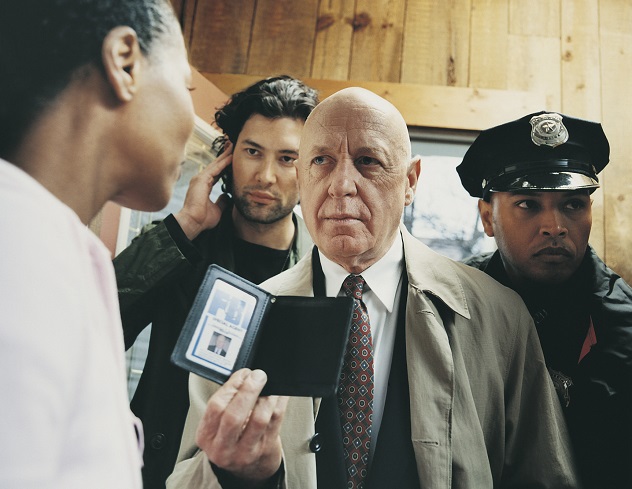 Mysteries
Mysteries  Mysteries
Mysteries  History
History 10 Surprising Stories About the Texas Rangers
 Humans
Humans 10 Philosophers Who Were Driven Mad by Their Own Theories
 Miscellaneous
Miscellaneous 10 Video-Game-Worthy Weapons and Armors from History
 Weird Stuff
Weird Stuff 10 Psychics Who Accurately Predicted Wartime Events
 The Arts
The Arts 10 Pieces of Art Inspired by a Broken Heart
 Health
Health 10 Science Fiction-Sounding New Medical Treatments
 History
History 10 Surprising Facts About the Father of Submarine Warfare
 Space
Space Ten Astonishing New Insights into Alien Worlds
 Weird Stuff
Weird Stuff 10 Bizarre Summer Solstice Rituals Still Practiced Today
 Mysteries
Mysteries Top 10 Haunting Facts About the Ghost Ship MV Alta
 History
History 10 Surprising Stories About the Texas Rangers
 Humans
Humans 10 Philosophers Who Were Driven Mad by Their Own Theories
Who's Behind Listverse?

Jamie Frater
Head Editor
Jamie founded Listverse due to an insatiable desire to share fascinating, obscure, and bizarre facts. He has been a guest speaker on numerous national radio and television stations and is a five time published author.
More About Us Miscellaneous
Miscellaneous 10 Video-Game-Worthy Weapons and Armors from History
 Weird Stuff
Weird Stuff 10 Psychics Who Accurately Predicted Wartime Events
 The Arts
The Arts 10 Pieces of Art Inspired by a Broken Heart
 Health
Health 10 Science Fiction-Sounding New Medical Treatments
 History
History 10 Surprising Facts About the Father of Submarine Warfare
 Space
Space Ten Astonishing New Insights into Alien Worlds
 Weird Stuff
Weird Stuff 10 Bizarre Summer Solstice Rituals Still Practiced Today
10 Unusual Crime Fighters
It takes all different kinds of people to fight crime. There are many different types of law enforcement agencies around the world, and there are even people who dress up in superhero costumes and patrol the streets. However, there are others—ordinary men and women working at normal day jobs—who investigated crimes or mysteries and ultimately brought wrongdoers to justice.
10Landon Crabtree

What always amazes adults about young people, especially children, is their natural adaptability to new technology. For example, take eight-year-old Landon Crabtree from Manchester, Tennessee, who managed to bring a serial criminal to justice with just an app.
After Landon’s house was burglarized, he went online and used a tracking app to locate his stolen iPad. The app allowed him to see where his iTunes software was being updated, ultimately showing where his iPad was. Landon’s father alerted the police after his son informed him the missing item had been located at a local motel.
Within an hour of his call, the police tracked down the iPad, along with the rest of the stolen goods and valuables from other houses. The room’s occupant, John Docherty, was arrested on sight. Following his arrest, it was discovered that Docherty was wanted for several other burglaries.
9Bill A. Jakob

Bill Jakob is the only person on this list who was in law enforcement, though he was unemployed at the time of this story. He was a small-town cop at one time, but he was never a state-certified police officer. He had also worked as a security guard and a wedding minister. According to records, his last known job was as the owner of a trucking company that went bankrupt.
Jakob’s home was 37 kilometers (23 mi) away from the small town of Gerald, Missouri, population 1,172. Like other small towns in America, Gerald was having trouble with methamphetamine. Jakob, calling himself “Sergeant Bill,” went to Gerald to help. He showed the local police a badge and told them he was an undercover agent from the Drug Enforcement Agency. He even produced a phone number they could call to verify his claims. When they called, a woman answered, claiming to work for “the multijurisdictional task force,” and confirmed that Jakob was undercover. Police later came to suspect that the name of the supposed task force had been lifted from the movie Beverly Hills Cop.
Wielding a shotgun, Jakob brought Gerald police along as he started kicking down doors and arresting suspects. When people asked to see a warrant, he told them he didn’t need a warrant because he was a federal agent. He handcuffed people and led them away without reading them their rights. In all, over the span of five months, he arrested about 20 people, and once in custody, most of the suspects confessed.
Jakob’s ruse unraveled when a suspicious reporter began looking into “Sergeant Bill’s” story. He was arrested and pleaded guilty to 23 charges, including impersonating a police officer, and was given a five-year prison sentence. The Chief of Police and two officers were also fired, and the town is now facing lawsuits for wrongful arrests. However, Gerald’s mayor said that at the time, Jakob was “very effective.”
8Joselyn Martinez

On November 22, 1986, Jose Martinez and his wife, Idalia, were working in their Inwood, New York restaurant, The Dominican Express. At some point during the night, Justo Santos and his two friends began to harass Idalia. Jose kicked them out, and Justo responded by shooting him, leaving Idalia a widow and their nine-year-old daughter, Joselyn, fatherless.
After the murder, Justo fled to the Dominican Republic. The only progress the police made in the investigation was getting Santos to confess on the phone in 1987. He was arrested, but for some reason, he was later released. After that, authorities lost track of Santos, and the murder of Jose looked like it was going to remain unpunished.
That was when Joselyn began investigating the murder that left a giant hole in her life. Her search began in 2005, using paid search engine services to track down her father’s killer. Over the next eight years, Joselyn tracked Justo’s movements and discovered that he was living in Miami, Florida under his own name. Joselyn turned the information over to the NYPD Cold Case Apprehension Squad, and on June 6, 2013, they arrested Justo at his home.
7Lee-Anne Cartier

On May 4, 2009, Philip Nisbet died in his home after eating dinner. His wife of eight months, Helen Milner, claimed that Nisbet had committed suicide. He had apparently intentionally induced an allergic reaction by taking a certain medication. Milner proffered a letter that appeared to be Nisbet’s suicide note.
The police seemed to accept her story, and the death of the 47-year-old was ruled a suicide, but Nisbet’s sister, Lee-Anne Cartier, had some reservations. She didn’t think that her brother was a suicidal person, and the signature on the note didn’t match her brother’s. Despite these concerns, police failed to investigate the possibility of foul play, so Cartier took it upon herself. First, she flew from her home in Australia to her brother’s home in Christchurch, New Zealand, to talk to his neighbors and boss. After she took the information she had gleaned to the police, it was revealed that the coroner had noted what appeared to be signs of suffocation on Nisbet’s body. This finally got the police moving on the investigation.
Milner was arrested, convicted of murder, and given an 18-year minimum sentence. The police admitted that they did not handle the case properly and offered to reimburse Cartier for the money she spent on the investigation. She rejected the offer, stating that she instead will be seeking a mysterious “wider compensation.”
6Yaakov German

On July 11, 2011, eight-year-old Leiby Kletzky went missing on his way home from a day camp in his neighborhood of Boro Park, Brooklyn. The people of Boro Park, a mostly Orthodox Jewish neighborhood, came together to search for the missing boy. One man, a property manager and father of 12 named Yaakov German, was a bit more dedicated than the rest.
German’s son was Kletzky’s teacher, so they started by looking at video surveillance from the school where the day camp was held. The next day, German also persuaded area shopkeepers to let him view their video surveillance. Through the videos, he was able to track the child’s movements. Finally, in footage from outside a car-leasing company, German saw Kletzky talking to a man before getting into his car.
The NYPD tracked the car to the apartment of hardware clerk Levi Aron. The police swarmed Aron’s apartment, and sadly, they found out the boy had been suffocated. Aron confessed to the crime and was given a sentence of 40 years.
5Jane Alexander

In 1983, 88-year-old Gertrude McCabe was brutally murdered in her home. She was beaten, stabbed multiple times, and choked with a bicycle chain. McCabe had no enemies, and since the house was in a state of disarray, the police investigators thought that the murder happened during a burglary. McCabe’s niece, Jane Alexander, wasn’t so sure. Alexander, who was a former intelligence officer in the Navy, thought that the murder might have something to do with a former boyfriend of hers named Tom O’Donnell.
Alexander started seeing O’Donnell at the age of 55 in 1977 after her husband had passed away. Tom was an old family friend, but Jane soon realized no one had any idea who Tom O’Donnell really was. First, O’Donnell convinced Alexander to take out a loan, using her house as collateral. Soon after, he took off with $10,000 of her money. Only after he fled did she look into her personal finances and realize that O’Donnell had left her on the brink of bankruptcy, forcing her to sell her house.
Alexander’s search for O’Donnell eventually led to Las Vegas, where he was arrested for fraud, but no one was able to find enough evidence to link him to McCabe’s murder. After Alexander spent the next 13 years working on the murder case with a police inspector named Jeff Ouimet, two key pieces of evidence finally turned up. The first was a witness, O’Donnell’s nephew, who said that his uncle had mentioned McCabe’s death the day before the police had discovered the body. The second was a police photo Alexander had found that linked O’Donnell to alterations of the crime scene. The investigation was reopened, and O’Donnell was arrested and convicted of first-degree murder with a life sentence. During the trial, prosecutors explained that O’Donnell likely murdered McCabe because he thought that Alexander would receive an inheritance.
4Susan Galbreath

On July 29, 2000, the body of 18-year-old Jessica Currin was found on the playing field of a school in Mayfield, Kentucky. Currin had died a horrible death—she had been raped, there was a belt around her neck, and her body was badly burned. The case was given to rookie detective Tom Fortner, who handled it very poorly. A suspect was arraigned and charged with the crime, but he turned out to be innocent. Fortner eventually quit his job with the force and became a security guard, leaving the Currin case to go cold.
It would probably have remained unsolved had it not been for Susan Galbreath. Galbreath was a Mayfield housewife who became obsessed with the murder. She collected information about the case and wrote to many different celebrities, including Julia Roberts and Oprah Winfrey, hoping to garner more media attention. She didn’t have any luck until she wrote to Tom Mangold in April 2004. Galbreath knew Mangold, a veteran journalist with the BBC, from his current events TV show, Panorama.
Amazingly, Mangold agreed to fly to Mayfield to investigate Currin’s case. Mangold and Galbreath interviewed various people attached to the crime, including Jeremy Adams, the man who was erroneously arrested for the crime. During their interviews, one name kept coming up: Quincy Cross, a drug dealer who lived in Tennessee. There was no solid evidence of Cross’s connection to the murder until 2006, when Galbreath received a message on her MySpace page from a woman named Victoria Caldwell admitting that she had helped Cross dump the body. Galbreath connected Caldwell to the police, and she told them the story of how Cross kidnapped, raped, and murdered Currin. Cross was convicted and given a life sentence without parole.
While Galbreath was thanked by some in the aftermath of the trial, she had angered many citizens during her investigation. She eventually had to move out of Mayfair.
3Rakesh Singh

In May 2009, Rakesh Singh was at a wedding with his family in Gurgaon, India when the music suddenly stopped. There had been a fatal hit-and-run accident outside the venue. Singh rushed outside to find that his 16-year-old son, Akshay, had been run over by a truck carrying 41 metric tons (45 tons) of mining equipment. The only way Singh knew it was his son was because he recognized his shirt. Otherwise, the teenager’s body was too mangled to be identified.
The heartbroken father demanded justice for his son, but the police did nothing more than file a report, so Singh took matters into his own hands. Taking time off from his job as an industrial consultant, Singh started eating at the roadside dhabas (restaurants) frequented by truck drivers. He even went as far as hitchhiking in order to meet and evaluate the truckers. Singh eventually found his man, Ravinder Kumar, who was promptly arrested by the police.
2Judy Weaver

On June 27, 2005, Judy Weaver was called to the hospital because her 34-year-old son, Ronald Johnson, had fallen into a coma after sustaining blunt force trauma to his head. Witnesses said that Johnson struck his head on the curb when he was trying to do tricks during a bicycle ride on a wet and rainy night.
That didn’t sit well with Weaver. When she saw Ronald on the gurney, she noticed that his pockets had been turned out as if he had been robbed. When she inspected the scene of the accident, she found that the bike was undamaged and there was no mark on the curb where Johnson allegedly struck his head. Weaver kept quiet about these suspicions until she could figure out what was going on. Meanwhile, Johnson succumbed to his injuries nine days later. The detective in charge of the case, Paul “Spike” Hopkins, ruled the death an accident on the basis of witness testimony.
Weaver then received a surprising visit from a 25-year-old man named Jason Gailey, who admitted that he had accidentally punched Johnson. Weaver brought the story to the police, but the case was closed, and they refused to reopen it. With the aid of her daughter, Deborah Moore, Weaver amassed a large file on the witnesses and the death of her son, to little avail.
One night in 2013, a sheriff’s deputy stopped by the restaurant where Weaver was working. Both Weaver and the deputy were having a slow night, so they sat down to talk, and Weaver unloaded for 45 minutes. She talked about all the details she had and slammed the sheriff’s department, especially Spike Hopkins, for their lack of interest in exacting justice for her son. The deputy took notes while he listened and said that he would try to persuade the cold case unit look into the case. That’s when he introduced himself to Weaver—as Lieutenant Paul “Spike” Hopkins.
Hopkins, true to his word, asked the cold case investigators to look into the crime. Using the information gathered by Weaver and Moore, the detectives interviewed the witnesses, and a new story emerged. Apparently, Gailey had been pistol-whipping another man, and Johnson tried to break it up. Gailey struck Johnson with the gun, which is when he fell to the cement and struck his head. Eight years after Johnson’s death, Gailey was arrested and charged with second-degree murder.
1Todd Matthews

In 1988, Todd Matthews became obsessed with a cold case that his wife, Lori, had mentioned to him. In 1968, Lori’s father had come across the body of an apparently murdered girl in Georgetown, Kentucky. The locals nicknamed her “Tent Girl,” and that was the name that was etched into her tombstone. She was a young woman with reddish brown hair and a gap in her front teeth. Other than that, no one knew anything about her.
The case deeply disturbed Matthews, who decided to uncover the true identity of Tent Girl. He scoured library records and police reports, looking for any clue that might help. As the Internet emerged, Matthews saved up to buy a computer specifically to search online message boards and other websites for clues. Matthews soon found he wasn’t alone in his search for a missing person. He came across thousands of people using the Internet for the same purpose.
That’s when the Doe Network was formed. It’s a message board for users to connect reports of missing people with reports of John and Jane Does. Run by volunteers, at first the group was criticized for being overzealous wannabe cops. They implemented screening procedures for the volunteers, and the Doe Network became a strong and useful tool for identifying bodies, succeeding in solving at least 67 cases.
Matthews’s work has led to serving on a national task force, which created the National Missing and Unidentified Persons System (NamUS) in 2007. The NamUS consists of a database of missing people that is cross-referenced with another database of unidentified bodies. The idea is that police departments and medical examiners will update the database and connections will be made.
As for Tent Girl, Matthew finally found what he was looking for on the Internet in 1998. He came across a message from Rosemary Westbrook of Benton, Arkansas, saying that she was looking for her sister, who went missing in 1968. She had reddish-brown hair and a gap in her front teeth. A DNA test confirmed that Weston’s missing sister, Barbara Ann Hackmann, was the same girl found by Lori Matthews’s father. After a 10-year struggle, Todd Matthews finally gave Tent Girl her name back.
Robert Grimminck is a Canadian crime fiction writer. You can follow him on Twitter or Facebook.








